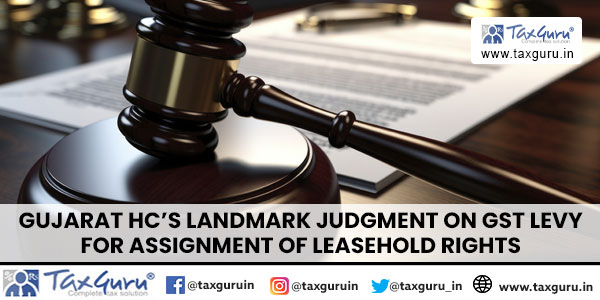The honourable Gujarat High Court on a very important litigation recently delivered a significant judgment addressing the complex question of liability of Goods and Services Tax (GST), its applicability on the assignment of leasehold rights for industrial plots allocated by the Gujarat Industrial Development Corporation (GIDC). The case originated from multiple special civil applications filed by the Gujarat Chamber of Commerce and Industry challenging the tax authority’s attempts to levy 18% GST on transactions involving the assignment of long-term leasehold rights. It could be seen that GIDC, established under the Gujarat Industrial Development Act of 1962, has been instrumental in developing industrial estates by acquiring land and creating essential infrastructure for establishing various Industries.
2. Let us dwell on the Key Technical Details. The leasing process typically involves several stages but predominantly encompasses the following four points.
- GIDC acquires and develops land with necessary infrastructure;
- A licensing agreement is executed with potential allottees;
- A registered lease deed is created for a 99-year period;
- The lease deed permits assignees to transfer leasehold rights with GIDC’s approval.

3. After the introduction of GST which came into effect on July 1, 2017, the tax authorities began issuing summons and show-cause notices to industrial plot holders. These notices alleged that Assignment of Leasehold rights are to be treated as supply of services, attract the levy of GST and consequently demanded GST at 18% on transaction value involving such assignment of leasehold rights. The Gujarat Chamber of Commerce and Industry challenged these notices, arguing that such transactions should not attract GST or alternatively, input tax credit should be allowed.
4. The court meticulously examined several relevant key definitions under the GST Act, which inter-alia included the following. The GST Act defines
“Business” expansively & inclusively as: {Section 2(17) of CGST Act 2017}
- Any trade, commerce, manufacture, profession
- Activities connected with or incidental to business
- Transactions with volume, frequency, or continuity
- Supply or acquisition of goods and services related to business commencement or closure
“Goods” are defined as: {Section 2(52) of CGST Act 2017}
- Every kind of movable property
- Excluding money and securities
- Including actionable claims
- Growing crops and things attached to land that are agreed to be severed
“Services” are defined as: {Section 2(102) of CGST Act 2017}
- Anything other than goods, money, and securities
- Activities relating to money use or conversion
- Includes facilitating or arranging transactions
“Scope of Supply” is defined as [Section 7(1)]
The critical provision defining taxability of supply includes:
- All forms of supply of goods or services
- Transactions made or agreed for consideration
- Conducted in the course or furtherance of business
- Covering sale, transfer, barter, exchange, license, rental, lease, or disposal
5. The key observations of the honorable Gujarat High Court in this judgement are:
- The term “Immovable property” has not been defined under the CGST Act,2017 however, the same is defined in the other enactments connected with the law of the land and it includes benefits arising out of parcel.
- In case of lease or long term contracts for that matter, the title over the plot remains with GIDC with all other rights reverting to it on expiry of lease period, whereas transaction of transfer of leasehold rights by the assignor in favour of assignee divest assignor of all the absolute rights in the property with absolute right for possession and its usage.
- The petitioner has transferred leasehold rights which is over and above the actual physical plot of land and building, embraces ethereal ownership right in such land and building such as the right to possess, to enjoy the income from, to estrange, or to recover ownership of such right from one who has improperly obtained the title.
- Under the Service Tax law, even the development rights which are the benefits arising from land were not liable to tax. Leasehold right is in fact a greater right and interest in land than development rights. The principle under the service tax regime can continue to apply under the GST regime too as it was the precursor.
- What is assigned by the assignor to the assignee is not only the land allotted by GIDC on lease but the entire land along with building which was constructed on such land. The same is a capital asset in the form of an immovable property.
On the basis of this position the Honourable Gujarat High Court held that assignment of leasehold rights is not leviable to GST.
6. While delivering the judgement the court’s analysis focused on determining whether the assignment of leasehold rights constitutes a “supply of service” under the GST Act or not. The judgment delved into intricate legal interpretations of various statutory provisions to resolve the fundamental question of tax liability. The verdict addresses a crucial issue regarding the applicability of GST in the context of leasehold rights transfers, alleviating a contentious tax burden for businesses with leased land holdings. Furthermore, it is anticipated that this judgement will be a precedent for similar disputes in various jurisdictions. In fact numerous cases involving analogous issues are currently pending in other courts, including the Bombay High Court, where questions surrounding applicability of GST on the transfer of industrial land by the Maharashtra Industrial Development Corporation (MIDC) are being contested.
7. A central point in these cases is whether GST should apply to leasehold or industrial land transfers, especially considering that such transactions are already liable for state-imposed stamp duties. Petitioners have argued that these deals should be categorized as sales of land, which are specifically exempt from GST according to existing legislation. The imposition of an 18% GST on each transfer escalates the tax burden disproportionately, resulting in tax cascading and making numerous transactions financially unviable. To sum up the judgement concludes that Goods and Services Tax (GST) does not apply to the transfer of leasehold rights on land allocated by the Gujarat Industrial Development Corporation (GIDC). This decision provides substantial relief to industries engaged in leasehold land transactions.
8. The judgment actually carries significant implications for industrial plot holders and businesses involved in transferring leasehold rights. It provides crucial clarity on the tax treatment of such transactions, potentially offering relief from what was perceived as an excessive tax burden. For tax authorities, this judgment represents an important judicial interpretation of the GST Act’s applicability. It may necessitate a recalibrated approach to taxing property-related transactions, especially those involving long-term leasehold rights.
Before bidding adieu…..
9. The honourable Gujarat High Court’s comprehensive judgment represents a nuanced examination of the intersection between property transactions and indirect taxation. By carefully analyzing the statutory framework, the court has provided much-needed guidance on the complex issue of GST applicability to leasehold right assignments. The case underscores the evolving nature of tax jurisprudence and the critical role of judicial interpretation in clarifying legislative intent. It serves as a significant precedent for similar disputes across the country, potentially influencing future tax assessments and interpretations. The ruling is expected to serve as a definitive reference point for similar cases involving leasehold right transfers, potentially reshaping how such transactions are viewed under the GST framework while it also touches upon the broader debate of whether long-term leases equate to land sales—a discussion that actually pre-dates the GST system.
10. While this landmark decision provides temporary clarity and will serve as a key precedent for similar legal issues across the country, achieving higher maturity in GST legislation and obtaining a final and definitive ruling from the Supreme Court is crucial to conclusively address and resolve the matter.





